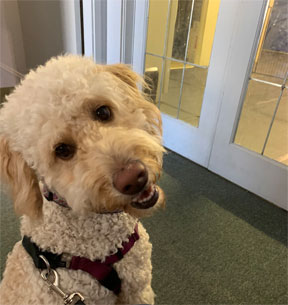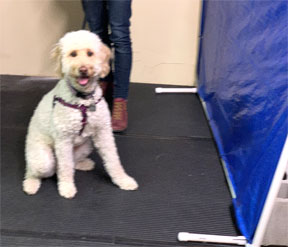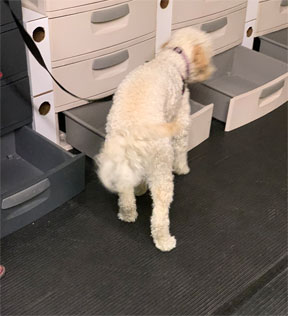We’re always looking for new ways to keep our energetic pup Pippa busy, so we signed up for an introductory nosework class to find out what it’s all about. Our dog seems to like ‘having a job’ so finding things with her nose could be a great way to keep her active and thinking, especially on rainy days when we can’t get outside as much as we’d like. We’ve played around with hiding and finding treats in the house, but we’re certainly not experts, so this intro class felt like a great opportunity to learn more about the strategies of trained nosework.
Introduction to Nosework
Our introductory course was hosted by Rich Hatchman of Doggone Smart Nosework. Rich is a retired Police Detection dog handler, scent work specialist and Sporting Detection Dog Association judge. We participated in a one hour session in which Rich worked with three dogs. Each dog had two individual time slots within the hour, working one-on-one with their person and Rich. Rich used food reward methods and positive re-enforcement to encourage our dog to demonstrate the ‘search’ behaviour when looking for scents.
Five Things We Liked About the Nosework Introduction
1. Distractions were minimized
There were other dogs in the session, but they were outside of the main game area, so Pippa had space to work. This was great because our extra social pup is usually so distracted by other dogs that she can’t even walk in a straight line, let alone work for us! The distraction of other dogs and nearby noises wasn’t enough to keep her from focusing on the challenge of the game.

2. The fun starts with a call of the dog’s name
Pippa had to seek and find food in a series of drawers, and her name was used as the cue to start the game. Having your dog respond to their name to start something fun is a great way to reinforce the idea that something wonderful happens when they answer to their name being called. We’re hoping this will help reinforce her recall, which is still a work in progress. 🙂

3. The game kept our dog thinking & moving
Our dog seems to train better when she works at a fast pace. By working with one dog at a time, our training window was entirely focused on our dog, so she never had time to get bored and withdraw from the action.
4. Leash pulling was allowed today!
After almost two years, we’re still working on loose-leash walking with our dog, so it was nice to just not worry about it for this game. She wore a top-clip harness for the game, rather than her usual collar clip or front-clip harness. I’m not sure how this will impact her ‘polite walking’ training, but it was fun to let her pull to reach her goal (finding the food).
5. Our dog was exhausted afterwards
Our hyper, clever dog needs things to do to tire her out, and working in this way wore her out without stressing her out. And it didn’t stress us out either! Games that make dogs think are a great way to help them burn energy, especially if you are pressed for time and can’t manage a long walk or a big play session. You may be familiar with the phrase “a tired dog is a good dog” and our dog was on her best behaviour after this session.
Progressing the Nosework Game

As this class was only a one-hour introduction, Pippa is certainly not ready to join the canine patrol team at the airport, but it gave us a good idea of where this work can take you and your dog. The game progresses from obvious patterns (bin 1, bin 2, bin 3 etc) to more random placement of food, so the dog who has ‘figured out the game’ by bypassing the first bin will have to use their search behaviour to find the food.
Once the food game has been established, new scents are introduced through use of essential oils. Rather than searching for a piece of food, the dog will learn to search for a specific scent. The location of the correct scent will also become more complex – moving from an open drawer in plain sight to an enclosed box or container. Eventually dogs can be trained to search for specific scents, and are rewarded by the handler when they find the scent.
If you’re looking for a new activity to engage your dog, consider trying a nosework class. If it goes really well for you and your pet, you may even want to try nosework competitions! Our first attempt was fun and rewarding, and stress free for both our dog and ourselves. Let us know how it goes for you!
